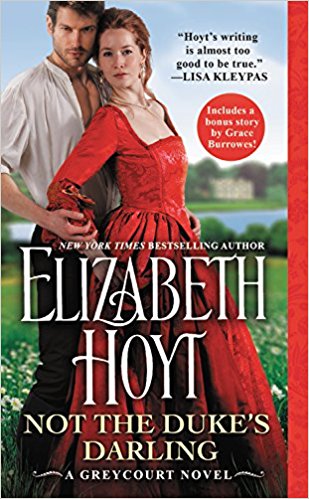 Not the Duke’s Darling (Greycourt, #1) by Elizabeth Hoyt
Not the Duke’s Darling (Greycourt, #1) by Elizabeth Hoyt Format: eARC
Source: supplied by publisher via Edelweiss, supplied by publisher via NetGalley
Formats available: paperback, ebook, audiobook
Genres: historical romance
Series: Greycourt #1
Pages: 496
Published by Forever on December 18, 2018
Purchasing Info: Author's Website, Publisher's Website, Amazon, Barnes & Noble, Kobo, Bookshop.org
Goodreads
New York Times bestselling author Elizabeth Hoyt brings us the first book in her sexy and sensual Greycourt Series!
Freya de Moray is many things: a member of the secret order of Wise Women, the daughter of disgraced nobility, and a chaperone living under an assumed name. What she is not is forgiving. So when the Duke of Harlowe, the man who destroyed her brother and led to the downfall of her family, appears at the country house party she's attending, she does what any Wise Woman would do: she starts planning her revenge.
Christopher Renshaw, the Duke of Harlowe, is being blackmailed. Intent on keeping his secrets safe, he agrees to attend a house party where he will put an end to this coercion once and for all. Until he recognizes Freya, masquerading amongst the party revelers, and realizes his troubles have just begun. Freya knows all about his sins—sins he'd much rather forget. But she's also fiery, bold, and sensuous—a temptation he can't resist. When it becomes clear Freya is in grave danger, he'll risk everything to keep her safe. But first, Harlowe will have to earn Freya's trust-by whatever means necessary.
Features a bonus novella from New York Times bestselling author Grace Burrowes!
My Review:
This is going to be a mixed feelings review. I’m all over the map about this one – and I didn’t expect to be. While I haven’t read ALL of the author’s Maiden Lane series, I’ve generally liked the ones I have read quite a bit.
But this one, well, yes and no.
On the one hand, it starts out with a bang, with Freya helping a desperate woman and her child escape from the man who wants to abuse them both. This particular escape isn’t about sex, it’s about money. The child is the rightful earl, her husband is dead, and his cousin plans to basically imprison the little boy and ransack the estate during his minority while keeping the boy’s mother away from him so she can’t support or protect him.
Women and young children were chattel, this chilling scenario was entirely possible – and legal. Freya has rescued both the mother and child, and is spiriting them away to a ship bound for America. But her pursuers are relentless, so she jumps into a nobleman’s carriage – only to discover that the nobleman in question is someone she knows – and loathes.
It should have been the start of a wild adventure, but the tension kind of fizzles out. Or at least it did for me.
While we do eventually find out why Freya hates the Duke of Harlowe so much (and those issues do reach resolution) what we really don’t get nearly enough information about is why Freya is participating in the rescue in the first place.
Not that the woman and her baby don’t need rescue, and not that someone shouldn’t do it. But how Freya got involved in the situation is murky. She’s a “Wise Woman”, a member of an order of independent women that has existed since the Roman occupation, if not before. She’s the “Macha” of the Wise Women, a title that seems to mean covert agent and spy as the situation requires.
But the Wise Women, while potentially interesting, never seem to get enough explanatory background, or at least not for this reader. What it felt like was simply a quick and dirty way of providing the 19th century heroine with the education, attitudes and perspectives that would appeal to 21st century readers. She’s so close to us that she feels anachronistic for her time.
That also seems to make her perfect for Christopher Renshaw, the aforementioned Duke of Harlowe, if they can get past the gigantic amount of baggage that stands between them.
Because the real backstory of this series seems to be the long-ago Greycourt scandal. Fifteen years ago, Harlowe, Freya’s brother Ranulf, and Julian Greycourt were the best of friends. Until one night when Julian’s sister tried to run off with Ranulf de Moray, and somehow she got herself killed and Ran got the blame. As well as a beating that cost him his dominant hand and his family’s place in society.
Freya has blamed Harlowe all these years, but as he eventually explains to her, he never believed that her brother was guilty of murder. And all three of the young men were, in fact, very, very young, only 18, and none of them had the position or the maturity to prevent the ensuing mess. Now he does, but the damage has already been done.
Personally, I believe that the overarching story in this series will be the eventual discovery of what happened that night, and that the individual books in the series are going to focus on all of the people who were affected by the scandal. Not just Harlowe and Freya, but eventually Julian Greycourt, the Greycourt sisters who were Freya’s friends once upon a time, Freya’s brother Ranulf, and whoever the hell the guilty party or parties turn out to be.
But we are not there yet. Much of this particular entry instead focuses on Freya’s activities with the Wise Women and their foes the Dunkelders, who believe that the Wise Women are witches who should be burned at the stake. They aren’t witches, but then, the great majority of those who were the victims of the witch hunts weren’t either.
Along with yet another rescue of another woman who desperately needs it.
The problems I have with the story all come back to the Wise Women. We don’t know enough for that piece of the story to really work. The Greycourt scandal grabbed my interest, as did the eventual romance between Harlowe and Freya, but it always felt like there was a hole in the back of the story – like a tooth cavity that you can’t stop sticking your tongue into – even though it hurts every time.
Escape Rating B-: I keep harping on the problem with the Wise Women, or rather the lack of enough information about the Wise Women. That’s because Freya’s participation in the group provides her with too many 21st century attitudes for too little data. One of the issues with historical romance is the difficulty of giving readers a heroine who has enough agency that we can identify with her while still having her fit into her time and place. And Freya doesn’t manage to walk that tightrope, at least not for this reader.
Your mileage may vary, or your version of the tightrope may be a bit wider than mine.




















One thought on “Review: Not the Duke’s Darling by Elizabeth Hoyt”
Comments are closed.